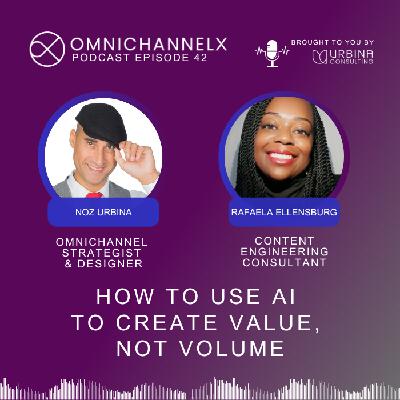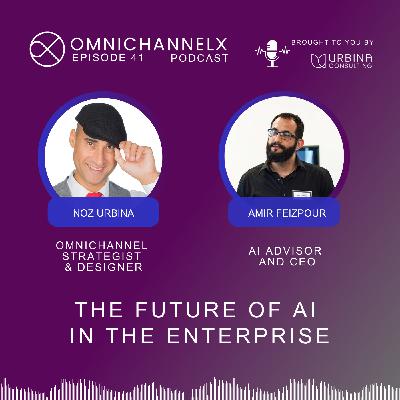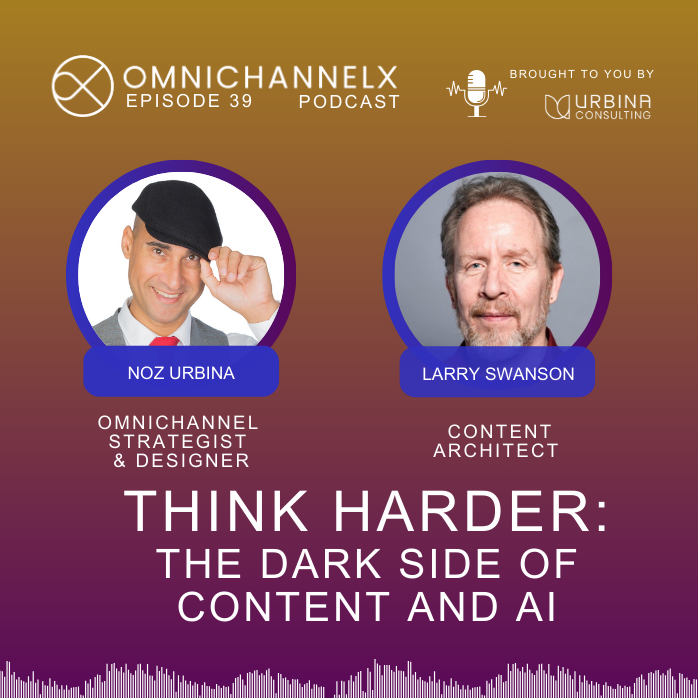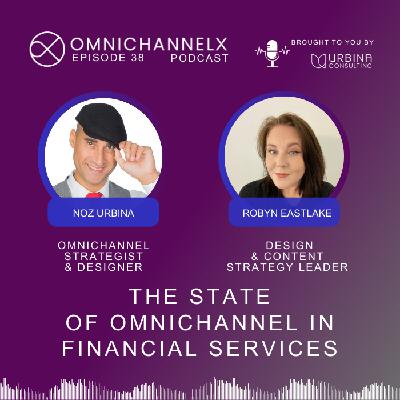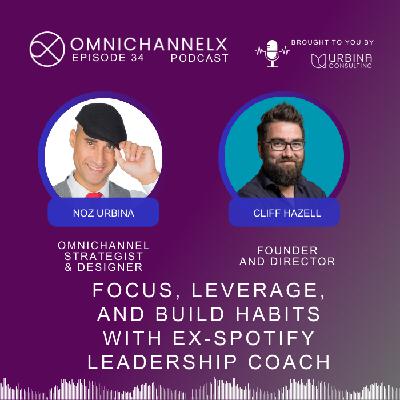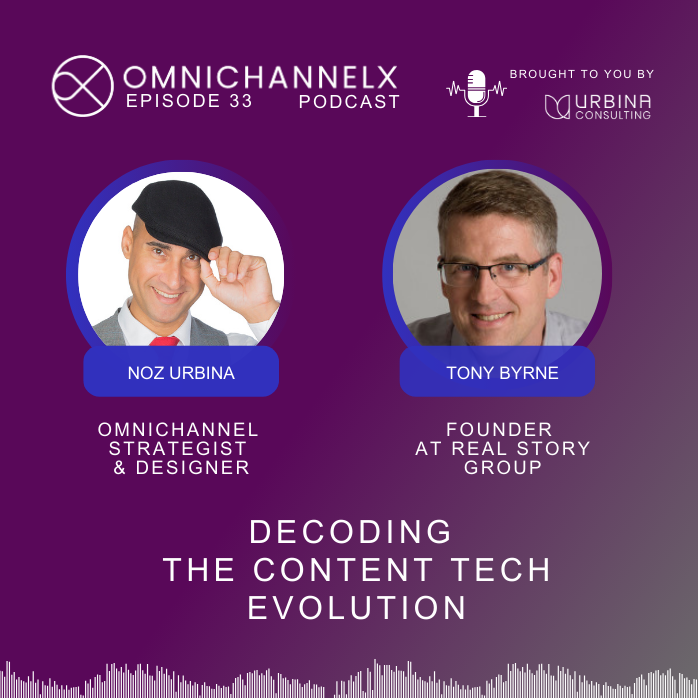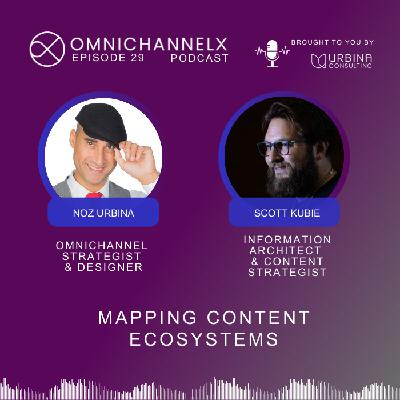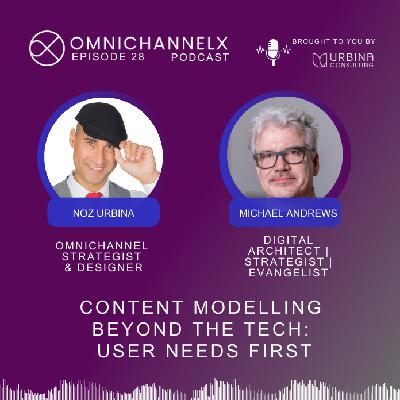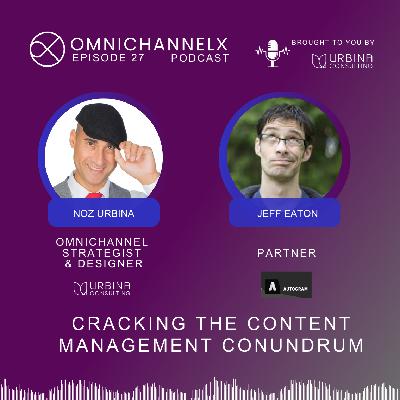Discover Omnichannel by OmnichannelX
Omnichannel by OmnichannelX

47 Episodes
Reverse
Why does information architecture remain misunderstood despite being fundamental to digital success? In this episode, information architect Dan Brown (Curious Squid) joins Noz Urbina to explore how IA goes far beyond website navigation. Using examples from taco truck franchises to enterprise fleet management, they discuss how structuring information around user questions can improve customer satisfaction, drive efficiency, and support business growth across all channels.
"When people ask me for a definition of information architecture, I describe it as the practice of designing structures... creating these frameworks that enable people to interact with information regardless of where or how that information exists." – Dan Brown
🎯 KEY TOPICS DISCUSSED:
• Three core business metrics that all decisions ladder up to: growth, customer satisfaction, and efficiency
• Frame every use case as a user question - both conscious questions ("How much is my phone bill?") and unconscious ones ("What should I pay attention to?")
• Three stakeholder types to address: money-focused (growth/efficiency), experience-focused (satisfaction), and tech-focused (scalability/innovation)
• IA creates multiple pathways through the same information based on different user needs and objectives
• Move beyond data tables - organize and present data in humane, meaningful ways that tell the right story
• Connect user questions to executive concerns - show how efficiently answering user questions impacts the three core metrics
• Use narrative storytelling with personas (like "Terry Taco Truck Owner") to make abstract IA concepts concrete and relatable
• IA is designing structures that enable people to interact with information regardless of where or how it exists
• Database architecture vs. information architecture - database architects store data efficiently, information architects weave it into meaningful stories
• The omnichannel imperative - everyone wants access to data in ways meaningful to them across all channels
What you'll learn:
Why information architecture is more than just website navigation
How to frame use cases as questions users are asking
The difference between database architecture and information architecture
Why metaphors both help and hinder the understanding of IA concepts
How to connect user questions to business metrics
The role of IA in omnichannel experiences
Practical approaches to selling IA value to stakeholders
How different audiences interact with the same information differently
🗣️ ABOUT THE HOST:
🔗 CONNECT WITH NOZ:
LinkedIn: https://www.linkedin.com/in/nozurbina/
Website: https://urbinaconsulting.com/
Book: https://contentstrategy-thebook.com/
🎙️ ABOUT OMNICHANNELX: The OmnichannelX Podcast explores the intersection of content, customer experience, and technology. Hosted by Noz Urbina, we bring you conversations with industry leaders navigating digital transformation.
Website: https://www.omnichannelx.digital/
Newsletter: https://mailchi.mp/645f8e163f9a/newsletter-sign-up-download-book
📧 GET IN TOUCH:
Have questions or want to be a guest?
Email: magda@urbinaconsulting.com
What if the problem with your marketing isn't that content takes too long to create? Noz Urbina and Bouke Vlierhuis examine how AI has shattered the traditional content workflow, revealing that creation was never the real problem – it was just hiding all the other broken processes. They explore practical AI use cases that actually work, why aerospace engineering principles apply to content strategy, and how to avoid becoming the person who just "looks over the ChatGPT texts."
🎯 KEY TOPICS DISCUSSED:
The "Chainsaw Effect" - How AI exposes all your process problems
Why 95% of AI projects fail (and how to be in the 5%)
The "Fountain Pen Syndrome" - Stop identifying with outdated skills
Process analysis is finally "hip" in marketing
From 2-week white papers to afternoon content creation
Why human-in-the-loop is non-negotiable The coming "trough of disillusionment" and how to prepare
📚 ABOUT THE BOOK:
Bouke's "AI Survival Guide for the B2B Marketer" (currently in Dutch) provides practical frameworks for B2B marketers navigating AI transformation. Not another prompt guide, but a strategic roadmap for process transformation
🔗 CONNECT WITH BOUKE:
LinkedIn: https://www.linkedin.com/in/boukevlierhuis/
Website: https://www.boukevlierhuis.nl/
Book: https://www.boekenbestellen.nl/boek/ai-survivalgids-voor-de-b2b-marketeer/74852
🔗 CONNECT WITH NOZ:
LinkedIn: https://www.linkedin.com/in/nozurbina/
Website: https://urbinaconsulting.com/
Book: https://contentstrategy-thebook.com/
🎙️ ABOUT OMNICHANNELX: The OmnichannelX Podcast explores the intersection of content, customer experience, and technology. Hosted by Noz Urbina, we bring you conversations with industry leaders navigating digital transformation.
Website: https://www.omnichannelx.digital/
Newsletter: https://mailchi.mp/645f8e163f9a/newsletter-sign-up-download-book
📧 GET IN TOUCH:
Have questions or want to be a guest?
Email: magda@urbinaconsulting.com
What if everything you've been told about AI implementation is backwards?
In the latest episode of the OmnichannelX podcast, host Noz Urbina sits down with Lasse Rindom, and they shatter the myth that AI is your secret weapon. Spoiler alert: it's not. With 127 million people using ChatGPT daily, AI has already become as common as Excel. The real question isn't whether you should use AI, but how to stop treating it like a magic wand and start building actual business value.
Through 67 episodes of interviewing AI leaders, Lasse has discovered a pattern: companies are failing because they're asking "what can AI do?" instead of "what do we want to achieve?" From exposing why your million-dollar AI investment might be worthless to revealing how "brownfield thinking" can save your transformation, this conversation flips conventional wisdom on its head. You'll discover why context engineering beats prompt engineering, how every business process is secretly about metadata, and why the Wright Brothers' invention of the airplane tells us everything we need to know about where AI is headed.
Whether you're a CEO wondering why your AI initiative isn't delivering ROI or a practitioner trying to move beyond chatbot experiments, this episode delivers the tough love and practical wisdom you need to succeed in 2025's AI reality.
"If you don't start with outcome and outcome discussion about what you want, then you're not gonna end up with outcome. And that has nothing to do with AI at all." – Lasse Rindom
Key Findings
AI is a commodity, not a differentiator - With 127 million daily ChatGPT users, the technology itself won't provide a competitive advantage; innovation on top of AI will
Process definition precedes successful AI implementation - Software vendors must own and define processes clearly for AI agents to navigate effectively within digital infrastructure
Brownfield reality trumps greenfield fantasies - Organisations must work with existing systems and constraints rather than imagining clean-slate implementations
Context engineering > Prompt engineering - Pre-prompting and establishing proper context matters more than individual user prompts for reliable AI performance
Metadata production is the essence of business processes - Every business process essentially adds metadata to transform inputs into outputs, making AI particularly suited for structuring unstructured data
Human change is the limiting factor - Technology adoption speed is constrained by how quickly humans can adapt their mental models and processes
Measurement from day one is critical - AI initiatives without clear KPIs and success metrics become expensive experiments rather than business improvement
00:00 Introduction and guest welcome
04:26 AI's role in business and value creation
08:05 "AI doesn't need a push - it's already here"
15:40 The importance of outcome-based AI implementation
18:29 Greenfield vs. brownfield: "The world is brownfield"
23:33 From playground money to real ROI
28:57 Beyond generative: AI as restructuring tool
33:38 "Every process is metadata production"
35:16 Reducing entropy: the true purpose of business
40:34 Context engineering vs prompt engineering
46:56 "The Wright Brothers didn't invent the airline"
In this episode, Noz Urbina interviews Ilya Venger, Data and AI Product Leader at Microsoft, to deliver a masterclass in practical AI implementation for business leaders. Ilya addresses the trillion-dollar question facing every executive: Should we build our own AI solution, buy off-the-shelf, or wait for the technology to mature? His answer: it depends on understanding your specific business problems, not chasing shiny technology. Key Takeaways The 80% Solution: Ilya reveals that AI systems work correctly about 80% of the time. Success isn’t about perfecting that last 20% through expensive fine-tuning – it’s about redesigning processes to work with AI’s probabilistic nature. As Noz puts it, “If you create a workflow with zero tolerance for error, you’ve designed a bad process.” The Fine-Tuning Trap: Ilya shares cautionary tales of companies spending millions to fine-tune models for specific problems (like the “six finger problem” in image generation), only to watch base models solve these issues within 18 months. His stark example: a model fine-tuned to be cheaper than GPT-4 became pointless when GPT-4’s price dropped tenfold. Data Reality Check: Both speakers agree that most organizations have “data heaps” – disconnected silos without understanding or metadata. Ilya’s metaphor: “You’ve got gold nuggets in a dark room. You need to turn on the lights first.” Organisations must understand their data landscape before implementing any AI solution. The Build vs. Buy Decision Framework: Build (Fine-tune): Only when you have extremely specific tasks with proprietary data (like recognizing manufacturing equipment or crop diseases) Buy: For most use cases, using off-the-shelf models with good system prompts and workflow design Wait: When your problem might be solved by next quarter’s model improvements What you’ll learn
The build, buy, or wait decision framework – Clear criteria for when to fine-tune models (specific tasks with proprietary data), buy off-the-shelf solutions (most use cases), or wait for base models to improve
Master the 80% solution – Why AI works correctly 80% of the time and three strategies to handle failures: improve the AI, modify your processes, or introduce human oversight
Avoid the million-dollar fine-tuning trap – Real examples of why custom models become obsolete within 18 months and when fine-tuning makes sense
Turn your “data heaps” into AI gold – How to assess and organize disconnected data silos before implementing AI, plus why most organizations fail at this critical first step
Design systems, not magic genies – Why thoughtful system prompts and workflow design deliver 10x better ROI than chasing the latest AI model
Handle AI’s “alien” failure modes – Understand how probabilistic systems fail differently than traditional software and build processes that expect interpretation errors
Find your real competitive edge – Why your IP isn’t in having a custom model but in process design, context setting, and treating AI as “10,000 eager interns”
Know when waiting beats racing – Recognise when today’s expensive problem (like the “six finger problem”) will be solved by next year’s base models
Noz Urbina interviews Rafaela Ellensburg, who has pioneered the content engineering discipline at Albert Heijn, one of the Netherlands' largest retailers. Rafaela discusses her journey from content specialist to content engineering leader, emphasising how structured content and metadata enable omnichannel measurement and personalisation at scale.
The conversation explores the evolution from content management to concept management, drawing parallels between content supply chains and traditional product supply chains.
Key topics include
translating strategic business goals into measurable content metrics,
implementing knowledge graphs and ontologies for cross-domain data connections, and
preparing high-quality structured data to enhance AI reliability.
"You allow yourself as an organization to bring forward that message to whichever person it resonates with in the market, and you're able to do it on whichever channel that person is present. You get the relevance, and you get it at scale, at an omnichannel scale—making sure that the right message is sent to the right customer at the right moment and the right channel. That is the marketer's dream, right? That's what we all want." – Rafaela Ellensburg
"I like to compare content to products. People know products—they know shopping, they know logistics, they know that products are created somewhere and then have to be refined before they get to the stores. It's something that people can grasp, but we can do the same thing for content." – Rafaela Ellensburg
"We as humans actually have work to do to make our data of AI quality—more complete, richer, more consistent and truthful, so that whatever the AI does with that data, it becomes better. You do not get garbage in, garbage out, but you get value in, value out." – Rafaela Ellensburg
In this podcast, Noz and Amir Faizpour talk about how businesses can effectively implement AI beyond basic tools like ChatGPT.
Amir, who runs Aggregate Intellect, explains why companies might need more sophisticated AI solutions that integrate with their existing business systems rather than using standalone AI tools.
The conversation focuses on “AI agents” – systems that can independently use tools and execute complex tasks – and the importance of separating language models from actual business data to ensure accuracy and reliability.
A key takeaway is that instead of relying on one large AI model for everything, businesses might benefit more from using multiple specialised models for different tasks, much like how human workflows operate.
What you’ll learn
Understanding why businesses might need solutions beyond standard AI tools like ChatGPT and Microsoft Copilot
The importance of integrating AI with existing business systems rather than using siloed solutions
How “agentic” AI systems work and their three key components: tool usage, memory, and planning capabilities
The value of separating language models from actual business data and knowledge
Why smaller, specialized AI models can sometimes be more effective than larger, general-purpose ones
The role of human oversight and knowledge in AI systems
How to evaluate and verify AI-generated content for accuracy and specificity.
“I have these nine commandments that I usually talk about when it comes to generative AI and one of them, which I think is the most important one, is the separating the knowledge, the data and the linguistic interface.”
“One of my biggest design principles is that the architecture of, or the anatomy, as you’re saying of the system, you’re building has to replicate the human workflow.” – Amir Feizpour
Noz Urbina joins Larry Swanson to explore a critical question: as AI becomes universal, how will we distinguish real from synthetic?
Their discussion delves into Truth Collapse - the AI-accelerated metacrisis that could make or break the world. They examine the challenges facing our institutions, cultures, and individual stability when both simple and sophisticated AIs become an integral part of daily life, and what this means for our collective future.
What you'll learn:
The importance of humility and understanding our vulnerabilities to predict and prepare for the future.
The psychological manipulation techniques used by tech companies, such as Skinner boxes and addictive design.
The role of AI in cultural participation and the associated risks.
The potential dangers of AI in terms of emotional manipulation and truth collapse.
Legislative measures that could mitigate the negative impacts of AI.
Noz Urbina and Larry Swanson examine the fundamental aspects of AI ethics as artificial intelligence becomes increasingly embedded in society. Their discussion covers five key insights into AI ethics that help safeguard our future, exploring big tech manipulation tactics, corporate power dynamics throughout history, and the role of government regulation in technology. The conversation addresses how we can better understand and navigate these ethical complexities as AI integration deepens.
What you'll learn:
Understand the dual aspect of AI and technology: potential benefits and significant ethical dilemmas
How technologies, particularly AI, are designed to exploit human psychology for profit (e.g., social media platforms using addiction mechanics)
Historical roots of corporate power and its implications for modern-day technology practices
Insight into the necessity for governmental intervention and effective policy-making to regulate tech companies and protect societal interests
An exploration of personal and collective responsibility in fostering a healthier relationship with technology and governance.
Noz Urbina and Robyn Eastlake discussed the current state of omnichannel in the financial services sector, emphasizing its crucial role in meeting users' needs and staying connected with businesses. They highlighted the importance of content efforts being connected and omnichannel, and offered tips on how to implement successful omnichannel strategies. They discussed the challenges of creating a successful content strategy in the financial services industry, including balancing short-term goals with long-term thinking and leveraging AI in content design and automated experience design. They also explored the potential of AI in content production while maintaining the value of human creativity, and emphasized the need for a hybrid approach that leverages the strengths of both AI and human creativity.
"The challenge is always how do you remind everybody in the day to day that [long-term relationship building] is the goal. You have your setup where you have your manufacturing side of the business deciding lending policy and then you have your distribution, still pretty much set up by channel. They're not usually pretty well connected... Making sure that users feel valued, they feel safe, they're protected, and that the things that are being served to them are appropriate to them is hugely valuable for businesses." – Robyn Eastlake
Listen now
What you'll learn
Omnichannel Mastery: Insights on navigating omnichannel strategy in financial services.
Content Meets AI: How AI is shaping content strategies and what pitfalls to avoid.
User-Centric Design: The importance of aligning content with user needs and expectations.
Navigating Challenges: Key strategies for overcoming common obstacles in financial services.
Future Trends: Predictions on the evolution of content and digital experiences.
Noz Urbina sits down with Ashley Faus, Head of Lifecycle Marketing at Atlassian and contributor to TIME, Forbes, and The Journal of Brand Strategy. Together they unpack the power of content intent in boosting demand, exploring the distinction between learn vs. use intent, funnel phases in intent-focused strategies, and AI's role in content creation. The discussion covers streamlining content roles for team synergy, ensuring message harmony, and aligning marketing with audience needs.
“I actually think the funnel is a retrospective measurement tool, not a forward-looking strategy tool. Nobody wakes up in the morning and says, ‘Today I shall be in the awareness phase.’ People don’t behave that way. So, I like to frame up the audience journey in terms of a playground, where people can go up, down, sideways; they can chart their own journey.” – Ashley Faus
By the end of the episode, you’ll learn:
The Importance of Content Intent: Understand the difference between learn intent and use intent, and how this knowledge can dramatically improve demand generation and pipeline generation.
Redefining the Funnel: Learn how the traditional top-of-funnel, middle-of-funnel, and bottom-of-funnel model is evolving to accommodate content by intent, and why a mindset shift is necessary for effective marketing.
AI in Content Creation: Discover the spectrum of content creation from 100% human to 100% AI, and learn how to match the intent with the appropriate approach for creating meaningful content.
Audience Intent Mapping: Gain insights into mapping the customer journey to a “playground” model where consumers can chart their own path, moving beyond the linear funnel model to understand consumer behavior more accurately.
Content Planning and Strategy: Find out how breaking down content into actionable steps and clear CTAs can guide users more effectively towards their goals.
Effective Marketing through Understanding: Learn the importance of tailoring marketing messages to individual preferences and interests, and how understanding the job or message behind each piece of content can lead to more successful engagement.
Collaboration and Strategy in Content Marketing: Discover the critical role of collaboration across teams to create consistent messaging, the importance of a multichannel approach, and how to scale content marketing strategies effectively.
Noz Urbina, alongside our host Larry Swanson, go deeper into the transformative power of artificial intelligence across business, creativity, and more.
This discussion will uncover how AI is revolutionizing our methods of problem-solving, content creation, and decision-making.
Join us as Noz shares his journey through the evolution of AI, highlighting its potential to enhance human creativity and challenge our understanding of technology's role in society. Tune in to explore the complexities, opportunities, and future directions of AI in our rapidly evolving digital landscape.
"AI enables us all to be programmers without being coders. It's about understanding the problem, its context, its constraints, and the intended results, and being able to express that logically and clearly, understanding both your own bias and the AI's bias. That's what lets us win the future." - Noz Urbina
Noz Urbina explores the future of web development and content strategy with Steven Pemberton, a researcher whose contributions have shaped the World Wide Web, particularly in markup languages and web standards. Their conversation untangles the complexities of web technologies, focusing on structured content approaches and innovations in digital experiences.
"My fundamental point of view is that if it works, you should do it... My problems with AI is that firstly, there's no I in there yet, that it's machine learning but it's not artificial intelligence. So that you can't trust it." - Steven Pemberton
Noz Urbina delves into omnichannel strategy with Cliff Hazell, a founder, manager, and coach who has spent two decades dismantling barriers to exceptional work.
Their discussion explores how to unify engagement and communication strategies across multiple touchpoints, moving beyond parallel approaches to create complementary experiences. They examine how organizations can orchestrate content, design, governance, and systems to align with people's journeys and deliver what audiences truly need.
"If you automate stuff that is the wrong idea. You now have the bad things automated." - Cliff Hazell
Noz Urbina and Tony Byrne, Founder of Real Story Group, explore the evolving landscape of content management systems and digital asset management. Their discussion spans from the emergence of headless CMS to AI's growing influence in content strategy, offering a comprehensive look at how organizations can navigate modern content technologies. The conversation covers crucial developments in DAMs, practical approaches to technology selection, and the rise of Omnichannel Content Platforms (OCPs), providing listeners with strategic insights for making informed decisions in their digital transformation journey.
By the end of the episode, you'll learn:
Evolution of Content Management Systems: Understand how DAMs and CMS have evolved over the years, including the rise of headless CMS and the impact of AI
Strategic Technology Decisions: Learn the importance of having a clear strategy and vision when choosing content management technologies
The Future of DAMs: Explore how DAMs are expanding their capabilities, managing a wider range of assets, and playing a crucial role in the content lifecycle
The Role of AI in Content Strategy: Gain insights into how AI is transforming content creation and management, not just at the customer touchpoint but throughout the content lifecycle
Challenges with Headless CMS: Understand the limitations and potential pitfalls of headless CMS and the importance of hybrid solutions
Emerging Omni-channel Content Platforms: Discover the concept of Omni-channel Content Platforms (OCPs) and how they differ from traditional DAM and CMS solutions
Making Informed Technology Choices: Learn practical tips for navigating the complex content technology market and making decisions that align with your organization’s needs.
Noz Urbina and Brian Piper, Director of Content Strategy and Assessment at the University of Rochester, examine how digital marketing and content strategy continue to evolve with AI and emerging technologies. Their discussion covers practical applications of analytics for understanding user journeys, approaches to content optimization, and the potential of AR/VR in education. Drawing from his experience at the University of Rochester, Brian shares perspectives on measuring content performance and preparing for future digital experiences in the metaverse.
What you will learn:
Understanding the evolution and future of digital marketing and content strategy
Insights into the application and impact of AI and the metaverse in various fields
Strategies for optimizing content performance and user engagement
The role of analytics in understanding and improving user journeys
The potential of AR/VR in educational and professional settings.
In this enlightening episode of the podcast, host Noz Urbina sits down with Thomas Stilling, a seasoned expert in Digital Asset Management (DAM) and digital strategy.
With his extensive background at Forrester Research and 20th Century Fox, Thomas delves into the intricacies of DAM systems, their evolution, and their crucial role in powering omnichannel experiences.
The discussion also touches on the differences between DAMs and Content Management Systems (CMS), the emerging role of AI in DAMs, and the importance of effective governance and change management in maximizing the potential of digital assets.
This episode offers valuable insights for professionals grappling with the complexities of digital asset storage, findability, and efficient use in a multi-faceted digital environment.
In this episode, Noz Urbina sits down with Regina Lynn Preciado, senior content strategist with Content Rules, Inc.
They delve into the world of structured content and its critical role in the life sciences industry. With over two decades of experience in solving complex content challenges, Regina shares insights on how structured content can transform the way organizations manage and deliver information.
They discuss the unique content management challenges faced by life sciences companies, such as legacy content and the transition from traditional writing to component-based modular structures. Regina emphasizes the importance of content standardization across dimensions, from full deliverables to individual words, to create a unified and efficient content ecosystem.
The conversation also explores the benefits of content reuse, reducing redundancy, and achieving full traceability of changes. Regina and Noz shed light on how structured content enables personalized, channel-specific, and audience-specific communication, ultimately enhancing the user experience.
What you will learn:
The significance of structured content in life sciences.
The challenges faced by the industry in managing content.
How structured content helps overcome these challenges.
The journey from traditional content to modular, machine-friendly content.
Real-life examples of structured content transformation.
In this episode, Noz Urbina and Scott Kubie delve into the world of content ecosystem mapping. They discuss how this strategic approach can revolutionise content strategy by aligning digital strategy with business goals. Learn how to disambiguate and clarify your organisation's content reality, making it easier to see the forest for the trees. Scott discusses the blurring lines between designers and writers, emphasising the importance of integrating design and words to create holistic, strategy-driven content.
What you will learn:
Uncover your content reality through ecosystem mapping, breaking free from page-centric thinking
Explore crucial roles in the mapping process, including disambiguating roles for enhanced content operations
Foster a stronger connection between design and content by encouraging designers to embrace fidelity with words and iterative text refinement
Ensure consistency and scalability in an omnichannel world by embracing the editing function in content creation.
In this episode, Noz Urbina and Michael Andrews dive into the world of structured content and content modelling. They discuss the importance of bridging technical and business requirements, balancing the needs of omnichannel delivery with content creators' usability, and why not everything needs heavy modelling.
What you will learn:
The common challenges faced in creating and implementing a content model
How to strike a balance between technical requirements and content creator usability
Real-world examples of what to model and what to reference externally
The evolving nature of content models and their role in digital transformation.
In this episode, Noz Urbina and Jeff Eaton unravel the intricacies of content management systems, data structures, and the role of AI in today's digital landscape. From the challenges of migrating content to the importance of shared organizational language, this discussion offers valuable insights for content professionals and tech enthusiasts alike. Discover how AI can augment creativity and problem-solving, and gain a deeper understanding of the complexities behind content management.
What you will learn:
The varying needs of different content management systems and their overlapping domains
The critical role of content migration and its challenges in transitioning to a headless CMS
Why developing a shared organizational language and content structure is essential
The distinction between AI designing content models and recognizing patterns within existing structures
The power of AI as a creative tool to augment human creativity and generate novel ideas
Realistic expectations for emerging technologies and their iterative development.






